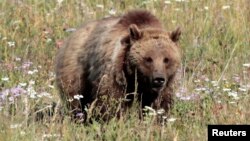Grizzly bears in and around Yellowstone National Park will be stripped of Endangered Species Act safeguards this summer, U.S. Interior Secretary Ryan Zinke announced on Thursday in a move conservation groups vowed to challenge in court.
Dropping federal protection of Yellowstone's grizzlies, formally proposed in March 2016 under the Obama administration, was based on the agency's findings that the bears' numbers have rebounded sufficiently in recent decades.
The estimated tally of grizzlies in the greater Yellowstone region, encompassing parts of Wyoming, Montana and Idaho, has grown to 700 or more today, up from as few as 136 bears in 1975 when they were formally listed as a threatened species through the Lower 48 states.
At that time, the grizzly had been hunted, trapped and poisoned to near extinction. Its current population well exceeds the government's minimum recovery goal of 500 animals in the region.
Lifting the bears' protected status will open them to trophy hunting outside the boundaries of Yellowstone park as grizzly oversight is turned over to state wildlife managers in Wyoming, Montana and Idaho, as well as to native American tribes in the region.
Hunters and ranchers, who make up a powerful political constituency in Western states, have strongly advocated removing grizzlies from the threatened species list, arguing the bears' growing numbers pose a threat to humans, livestock and big-game animals such as elk.
Environmentalists have raised concerns that while grizzlies have made a comeback, their recovery could falter without federal safeguards. They point to the fact that a key food source for the bears, whitebark pine nuts, may be on the decline due to climate change.
"The grizzly fight is on. We'll stop any attempt to delist Yellowstone's grizzlies," the Oregon-based Western Environmental Law Center said in a Twitter post.
"We anticipate going to court to challenge this premature, deeply concerning decision," Bethany Cotton, wildlife program director for the conservation group WildEarth Guardians, said Thursday.
Native American tribes, which revere the grizzly, also have voiced skepticism about ending its threatened classification.
Zinke said the final delisting rule by the U.S. Fish and Wildlife Service will be published "in coming days" and go into effect 30 days later.
As proposed last March, the rule will not affect four other smaller federally protected grizzly populations in parts of Montana, Idaho and Washington state. A much larger population in Alaska remains unlisted.





